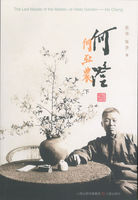Breaking the silence with snatches from The Beggar's Opera,he promised that all their lead should turn to gold,christened the coulter and the crow the Great and Little Samuel,and then went off to drink and dice at the Vintner's.How could anger prevail against this undying gaiety?And if Smith were peevish at failure,he was presently reconciled,and prepared once more to die for his Deacon.
Even after escape,the amateur is still apparent.True,he managed the trip to Flushing with his ancient extravagance;true,he employed all the juggleries of the law to prevent his surrender at Amsterdam.But he knew not the caution of the born criminal,and he was run to earth,because he would still write to his friends like a gentleman.His letters,during this nightmare of disaster,are perfect in their carelessness and goodfellowship.In this he demands news of his children,as becomes a father and a citizen,and furnishes a schedule of their education;in that he is curious concerning the issue of a main,and would know whether his black cock came off triumphant.Nor,even in flight,did he forget his proper craft,but would have his tools sent to Charleston,that in America he might resume the trade that had made him Deacon.
But his was the art of conduct,not of guile,and he deserved capture for his rare indifference.Why,then,with no natural impulsion,did he risk the gallows?Why,being no born thief,and innocent of the thief's cunning,did he associate with so clever a scoundrel as George Smith,with cowards craven as Brown and Ainslie?The greed of gold,doubtless,half persuaded him,but gold was otherwise attainable,and the motive was assuredly far more subtle.Brodie,in fact,was of a romantic turn.He was,so to say,a glorified schoolboy,surfeited with penny dreadfuls.He loved above all things to patter the flash,to dream himself another Macheath,to trick himself out with all the trappings of a crime he was unfit to commit.It was never the job itself that attracted him:he would always rather throw the dice than force a neighbour's window.But he must needs have a distraction from the respectability of his life.Everybody was at his feet;he was Deacon of his Guild,at an age whereat his fellows were striving to earn a reputable living;his masterpieces were fashioned,and the wrights'trade was already a burden.To go upon the cross seemed a dream of freedom,until he snapped his fingers at the world,filled his mouth with slang,prepared his alibi,and furnished him a whole wardrobe of disguises.
With a conscious irony,maybe,he buried his pistols beneath the domestic hearth,jammed his dark lantern into the press,where he kept his gamecocks,and determined to make an inextricable jumble of his career.Drink is sometimes a sufficient reaction against the orderliness of a successful life.
But drink and cards failed with the Deacon,and at the Vintner's of his frequentation he encountered accomplices proper for his schemes.Never was so outrageous a protest offered against domesticity.Yet Brodie's resolution was romantic after its fashion,and was far more respectable than the blackguardism of the French Revolution,which distracted housewifely discontent a year after the Deacon swung.Moreover,it gave occasion for his dandyism and his love of display.If in one incarnation he was the complete gentleman,in another he dressed the part of the perfect scoundrel,and the list of his costumes would have filled one of his own ledgers.
But,when once the possibility of housebreaking was taken from him,he returned to his familiar dignity.Being questioned by the Procurator Fiscal,he shrugged his shoulders,regretting that other affairs demanded his attention.As who should say:it is unpardonable to disturb the meditations of a gentleman.He made a will bequeathing his knowledge of law to the magistrates of Edinburgh,his dexterity in cards and dice to Hamilton the chimneysweeper,and all his bad qualities to his good friends and old companions,Brown and Ainslie,not doubting,however,that their own will secure them `a rope at last.'In prison it was his worst complaint that,though the nails of his toes and fingers were not quite so long as Nebuchadnezzar's,they were long enough for a mandarin,and much longer than he found convenient.Thus he preserved an untroubled demeanour until the day of his death.Always polite,and even joyous,he met the smallest indulgence with enthusiasm.When Smith complained that a respite of six weeks was of small account,Brodie exclaimed,`George,what would you and I give for six weeks longer?Six weeks would be an age to us.'
The day of execution was the day of his supreme triumph.As some men are artists in their lives,so the Deacon was an artist in his death.Nothing became him so well as his manner of leaving the world.There is never a blot upon this exquisite performance.It is superb,impeccable!Again his dandyism supported him,and he played the part of a dying man in a full suit of black,his hair,as always,dressed and powdered.The day before he had been jovial and sparkling.He had chanted all his flash songs,and cracked the jokes of a man of fashion.But he set out for the gallows with a firm step and a rigorous demeanour.He offered a prayer of his own composing,and `OLord,'he said,`I lament that I know so little of Thee.'The patronage and the confession are alike characteristic.As he drew near the scaffold,the model of which he had given to his native city a few years since,he stepped with an agile briskness;he examined the halter,destined for his neck,with an impartial curiosity.
His last pleasantry was uttered as he ascended the table.















